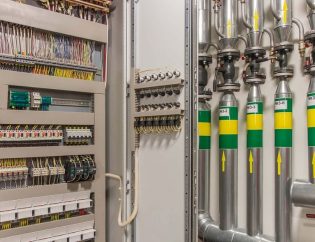Heating and Cooling Split Systems
The Heating and Cooling Split System is the most common type of HVAC system found in residential and small commercial settings. This system is designed to regulate the temperature of the indoor environment by providing both heating and cooling functions. It comprises two main components: an indoor unit and an outdoor unit. The indoor unit contains the evaporator coil and the air handler, while the outdoor unit contains the compressor and the condenser coil. The two units are connected by refrigerant lines that circulate the refrigerant between them.
Advantages:
- Split systems are relatively easy to install compared to other HVAC systems. The installation process typically involves mounting the indoor and outdoor units, connecting the refrigerant lines and wiring, and performing a startup test. They are also easy to maintain as they have fewer components, and each component can be accessed easily for repair or replacement.
- Split systems are relatively affordable compared to other types of HVAC systems such as central air conditioning or heat pumps. They are a cost-effective option for homeowners who want to add heating and cooling to their homes without breaking the bank.
- Split systems are best suited for small to medium-sized spaces, such as apartments or small houses. They can efficiently heat or cool rooms up to a certain size, but may not be suitable for larger commercial spaces.
- Split systems can be used for both heating and cooling, providing year-round comfort. They can switch between heating and cooling modes with the flip of a switch, making them a versatile choice for homeowners.
Disadvantages:
- Split systems may not provide enough heating or cooling power for larger commercial spaces. In such cases, a more powerful HVAC system, such as a central air conditioning or heat pump system, may be required.
- Split systems can be noisy when in operation, especially the outdoor unit. This noise can be a nuisance to some users, particularly if they live in quiet neighborhoods or have noise-sensitive neighbors.
- Split systems may not be as energy-efficient as other types of HVAC systems, such as central air conditioning or heat pumps. This can lead to higher energy bills over time, which can be a concern for homeowners who are looking to save on their utility bills.
- Split systems provide temperature control for individual rooms or zones, but they may not provide precise temperature control within each room. This can be a problem for some users who require precise temperature control, such as those with certain medical conditions or those who work from home and require a specific temperature for their workspace.
Applications:
- Residential homes
- Small commercial buildings
- Retail stores
Hybrid Split Systems
Hybrid Split Systems, also known as Dual Fuel Systems, are designed to be more energy-efficient than Heating and Cooling Split Systems. These systems combine the use of an electric heat pump and a gas furnace to provide heating and cooling functions. The heat pump is used during moderate temperatures, while the gas furnace is used during extreme temperatures.
Advantages:
- Hybrid Split Systems are more energy-efficient than Heating and Cooling Split Systems. They use a combination of electric and gas power to provide heating and cooling, which can significantly reduce energy consumption and lower utility bills.
- Hybrid Split Systems provide both heating and cooling, making them a versatile choice for homeowners. They can switch between heating and cooling modes with the flip of a switch, providing year-round comfort.
- Hybrid Split Systems are designed to operate in a wide range of temperatures, making them suitable for moderate to extreme climates. They can effectively cool a home during hot summers and provide heat during cold winters.
- Hybrid Split Systems are more environmentally friendly than other types of HVAC systems. They produce lower emissions than traditional heating systems, reducing their impact on the environment.
Disadvantages:
- Hybrid Split Systems are more expensive than Heating and Cooling Split Systems. The cost of installation, maintenance, and repair can be higher, making them a less affordable option for some homeowners.
- Hybrid Split Systems require more maintenance than Heating and Cooling Split Systems. They have more components and require regular cleaning, inspection, and tune-ups to ensure optimal performance. This can add to the overall cost of ownership over time.
- Hybrid Split Systems may require more complicated installation procedures than Heating and Cooling Split Systems. This is because they have both electric and gas components, which require specific safety measures and equipment during installation.
- Hybrid Split Systems may not be as widely available as other types of HVAC systems, such as central air conditioning or heat pumps. This can make it difficult to find a qualified installer or obtain replacement parts if needed.
Applications:
- Residential homes
- Small commercial buildings
Duct-Free (Mini-Split) Systems
Duct-Free (Mini-Split) Systems are ideal for buildings where the installation of ductwork is not possible or practical. These systems are designed to provide heating and cooling functions without the need for ductwork. The system comprises an outdoor unit and one or more indoor units that are mounted on the wall or ceiling.
Advantages:
- Duct-Free (Mini-Split) Systems are easy to install and maintain, as they do not require ductwork. They consist of a small indoor unit and an outdoor unit that are connected by a small conduit, making installation and maintenance simple and straightforward.
- Duct-Free (Mini-Split) Systems are an ideal solution for buildings where ductwork is not possible or practical. They can be installed in small spaces, apartments, or historic buildings where traditional HVAC systems are not an option.
- They are energy-efficient, as they use advanced technology to deliver precise heating and cooling. They also allow for zoned heating and cooling, which means that users can heat or cool only the areas they need, reducing energy consumption and costs.
Disadvantages:
- Duct-Free (Mini-Split) Systems are typically more expensive than Heating and Cooling Split Systems. The cost of installation, maintenance, and repair can be higher, making them a less affordable option for some homeowners.
- They may not be suitable for large commercial spaces, as they have limited capacity and may not be able to provide sufficient heating or cooling for larger areas. In such cases, a larger and more powerful HVAC system may be required.
Applications:
- Residential homes
- Small commercial buildings
- Hotel rooms
- Server rooms
Packaged Heating and Air Conditioning Systems
Packaged Heating and Air Conditioning Systems are ideal for commercial buildings where space is limited. These systems are designed to be installed on a rooftop or on the ground. The system comprises a single unit that contains all the components needed for heating and cooling.
Advantages:
- Packaged Heating and Air Conditioning Systems are designed to be compact and take up less space than traditional HVAC systems. This makes them ideal for small homes or buildings with limited space.
- Packaged Heating and Air Conditioning Systems are easy to install, as they come pre-assembled and are designed for quick and simple installation. This can save time and money during installation and reduce disruptions to daily life.
- Packaged Heating and Air Conditioning Systems are energy-efficient, as they use advanced technology to deliver precise heating and cooling. They are also designed to operate quietly and smoothly, reducing energy consumption and costs.
- Packaged Heating and Air Conditioning Systems are versatile and can be used in both residential and commercial settings. They are available in a range of sizes and capacities, making them suitable for a variety of applications.
Disadvantages:
- Packaged Heating and Air Conditioning Systems may not be as flexible as other types of HVAC systems, as they are designed as a single unit and cannot be customized or modified easily.
- Packaged Heating and Air Conditioning Systems can be more expensive than other types of HVAC systems. The cost of installation, maintenance, and repair can be higher, making them a less affordable option for some homeowners.
- Packaged Heating and Air Conditioning Systems may require professional installation, as they are more complex than some other types of HVAC systems. This can add to the overall cost of ownership over time.
Applications:
- Small to medium-sized commercial buildings
- Retail stores
- Restaurants
Conclusion:
In conclusion, HVAC systems are essential in regulating the indoor environment, ensuring that occupants remain comfortable and healthy. The different types of HVAC systems offer various advantages and disadvantages, making them suitable for different applications. Heating and Cooling Split Systems are ideal for small to medium-sized residential and commercial buildings, while Hybrid Split Systems are more energy-efficient and suitable for moderate to extreme temperatures. Duct-Free (Mini-Split) Systems are ideal for buildings where the installation of ductwork is not possible or practical, while Packaged Heating and Air Conditioning Systems are suitable for small to medium-sized commercial buildings where space is limited.
It’s important to consider the specific needs and requirements of a building when selecting an HVAC system. Working with a qualified HVAC professional can help ensure that the system is properly sized and installed for optimal performance and energy efficiency. Trust ECSKSA to provide you with the best HVAC panels available on the market today. Contact us now to learn more and get started!
Do you have a question in your mind? If so, make sure to fill out the form below!


